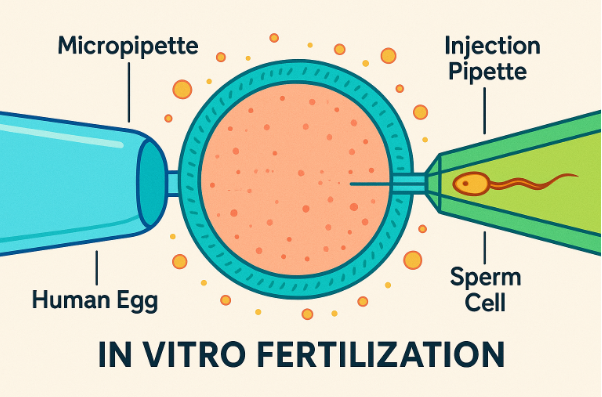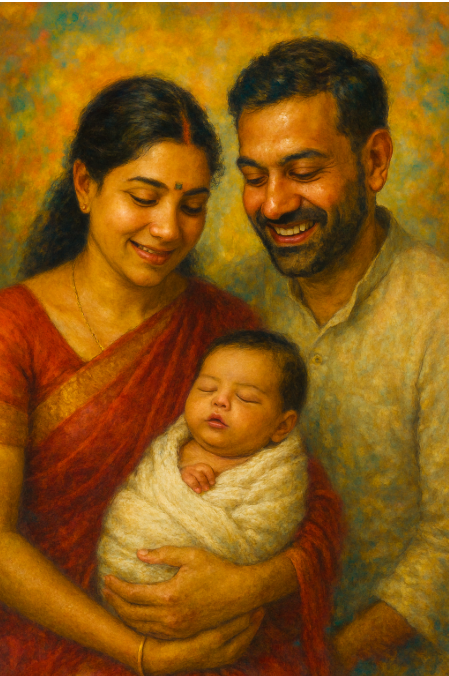
World IVF Day: Celebrating the science, stories, and struggles of assisted parenthood
July 25 marks World IVF Day—a global reflection on one of the most significant advancements in reproductive medicine. First achieved in 1978, in-vitro fertilization (IVF) has since enabled millions of people to experience the joy of parenthood. On this day, we reflect on the science, the lives it has transformed, and the ethical and social conversations it continues to spark.
A Medical Milestone That Changed Lives Forever
On July 25, 1978, Louise Joy Brown was born in Oldham, England. Her birth wasn’t just a private family triumph—it was a seismic shift in the world of medicine. Louise was the first child born through IVF, a process that involved fertilizing an egg outside the human body and then implanting the resulting embryo into the uterus. Developed by embryologist Robert Edwards and gynecologist Patrick Steptoe, IVF offered hope to couples struggling with infertility—a hope that would grow exponentially in the years to come.

The technique has undergone numerous innovations since then, including ICSI (intracytoplasmic sperm injection), embryo freezing, preimplantation genetic testing (PGT), and even egg and sperm donation. What was once experimental has become routine in over 60 countries.
The Human Side of IVF: Joy, Struggle, and Tenacity
Behind every IVF statistic lies a deeply personal journey. For many couples and individuals, IVF is not just a scientific procedure—it is a lifeline. According to the International Committee Monitoring Assisted Reproductive Technologies (ICMART), over 8 million babies have been born globally through IVF and related techniques since 1978. But the path to those births is often marked by repeated failures, emotional fatigue, financial strain, and ethical dilemmas.
Take Priya and Anuj (names changed for privacy), an Indian couple who tried conceiving for over a decade before turning to IVF. After three failed cycles, they finally succeeded. “It’s a journey no one prepares you for,” Priya shares. “The injections, the tests, the hope, the disappointment—it all becomes part of your life. But today, I have my daughter. And she was worth every moment of it.”
The emotional toll is not limited to couples. Single parents by choice, LGBTQ+ individuals, and cancer survivors—IVF has widened the definition of family, enabling diverse forms of parenthood that were once constrained by biology or society.
The Economic and Ethical Landscape
Despite its promise, IVF is far from universally accessible. In many countries, the procedure is prohibitively expensive, costing anywhere from $3,000 to $20,000 (Rs 2.60 to Rs 17.30 lakh) per cycle, depending on the region and the complexity of the case. In countries like India, while public and private partnerships are making IVF more accessible, affordability remains a concern for a significant portion of the population.
Then there are ethical questions: Should older women be allowed to conceive using donor eggs? What happens to unused embryos? Is it moral to select embryos based on genetic traits?
Additionally, the commercialization of IVF has led to “fertility tourism,” where people travel across borders in search of lower-cost or less regulated treatments. This has raised questions about exploitation, especially in low-income nations with less oversight.
The Intersection of Culture, Religion, and Science
The conversation around IVF is not merely scientific or economic—it is deeply cultural. Different societies interpret IVF through varied religious and moral lenses. In predominantly Catholic nations, for example, the Church’s official stance opposes artificial fertilization that separates procreation from the marital act.
In contrast, Islamic jurisprudence permits IVF under specific conditions, primarily between married couples using their genetic material. Hindu philosophy is generally more accepting, with a focus on the dharma of parenthood and societal duty.
Across faiths and traditions, what is common is the struggle to reconcile age-old beliefs with contemporary medical possibilities—a dialogue that continues to evolve.
IVF in the Age of Technology
Advances in artificial intelligence, genomics, and cryopreservation are further pushing the boundaries of IVF. AI algorithms can now help embryologists select the most viable embryos with greater accuracy. Time-lapse imaging tracks embryo development in real time, and genetic screening has become more refined and accessible.
There’s also an increasing emphasis on personalization—using big data to understand how a specific patient may respond to a particular drug or protocol. In the future, we might even see lab-grown gametes or synthetic wombs, concepts that seem like science fiction today but are under active research.
Toward a More Inclusive Future

One of the biggest challenges for IVF in the future is equity. While Europe and North America dominate access to and innovation in IVF, parts of Africa, Latin America, and Southeast Asia are still catching up. Non-profit initiatives and tech-driven fertility startups are working to democratize IVF, offering simplified and low-cost procedures and expanding awareness.
Another crucial front is mental health. IVF patients often go through cycles of grief and anxiety. Increasingly, clinics are integrating psychological support into treatment plans, recognizing that reproductive health is not just physical but also deeply emotional.
Celebrating IVF: Beyond the Clinic
World IVF Day is not merely a commemoration of a medical breakthrough—it’s a tribute to human resilience and scientific ingenuity. It’s a day to honor the doctors, embryologists, nurses, counselors, and most importantly, the families—biological, chosen, and in-the-making—who are part of this journey.
As we celebrate over four decades of IVF, we are reminded that the heart of this innovation lies not in the laboratory, but in the home—the cry of a newborn, the dreams of expectant parents, and the hope that science can indeed change lives.
Final Thought
The future of IVF lies in our collective responsibility—to make it safer, more ethical, more affordable, and more inclusive. As reproductive science continues to evolve, so too must our social frameworks and policies. On this World IVF Day, let us celebrate not just how far we’ve come, but how much further we can go to ensure that everyone, everywhere, has the chance to build the family they dream of.
Disclaimer
Views expressed above are the author’s own.
END OF ARTICLE